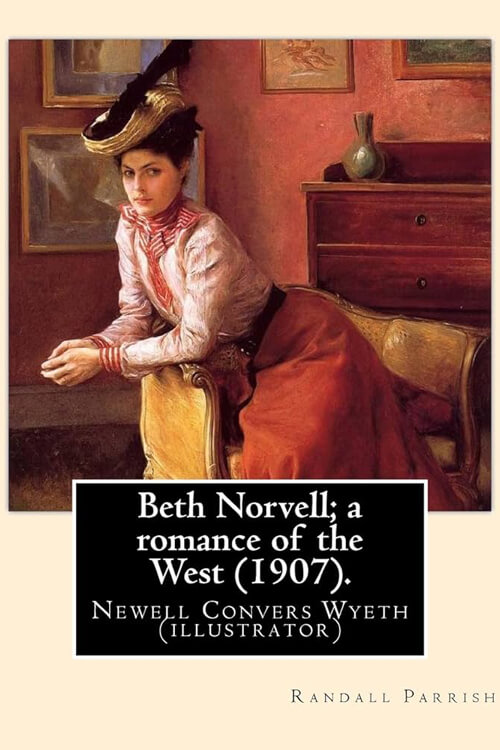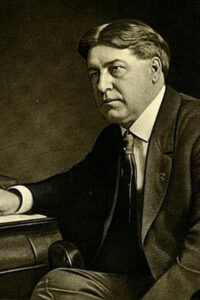
Beth Norvell, A Romance of the West
There were nine altogether in the party registering. This number included the manager, who, both on and off the stage, quite successfully impersonated the villain—a rather heavy-jawed, middle-aged fellow, of foreign appearance, with coarse, gruff voice; three representatives of the gentler sex; a child of eight, exact species unknown, wrapped up like a mummy; and four males. Beyond doubt, the most notable member of the troupe was the comedian “star,” Mr. T. Macready Lane, whose well-known cognomen must even now awaken happy histrionic memories throughout the Western circuit. The long night’s ride from their previous stand, involving as it did two changes of trains, had proven exceedingly wearisome; and the young woman in the rather natty blue toque, the collar of her long gray coat turned up in partial concealment of her face, was so utterly fatigued that she refused to wait for a belated breakfast, and insisted upon being at once directed to her room. There was a substantial bolt decorating the inside of the door, but, rendered careless by the sheer exhaustion of both mind and body, she forgot everything except her desire for immediate rest, dropped her wraps upon the only chair visible, and flung herself, fully dressed, upon the bed. Her cheek had barely pressed the hard pillow before she was sleeping like a tired child.
It must have been an hour later when Winston drove in from Flat Rock, shook the powdery snow from off his long fur overcoat, his cheeks still tingling from the sharp wind, and, with fingers yet stiffened by the cold, wrote his name carelessly across the lower line of the dilapidated hotel register.
“Can you let me have the same room, Tom?” he questioned familiarly of the man ornamenting the high stool behind the desk.
The latter, busy with some figures, nodded carelessly, and the last arrival promptly picked up his valise from the floor and began climbing the stairs, whistling softly. He was a long-limbed, broad-chested young fellow, with a clean-shaven face, and a pair of dark-gray eyes that looked straight ahead of him; and he ran up the somewhat steep steps as though finding such exercise a pleasure. Rounding the upper railing, he stopped abruptly before Number 27, flung open the door, took a single step within, and came to a sudden pause, his careless whistling suspended in breathless surprise. With that single glance the complete picture became indelibly photographed upon his memory,—the narrow, sparsely furnished room with roughly plastered walls; the small, cheap mirror; the faded-green window curtain, torn half in two; the sheet-iron wash-stand; the wooden chair, across which rested the gray coat with the blue toque on top; and the single cot bed bearing its unconscious occupant.
Read or download Book
Randall Parrish
George Randall Parrish (1858–1923) was an American lawyer, journalist, and writer – in particular, the author of dime novels, including Wolves of the Sea (Being a Tale of the Colonies from the Manuscript of One Geoffry Carlyle, Seaman, Narrating Certain Strange Adventures Which Befell Him Aboard the Pirate Craft “Namur”).
Early life
Parrish was born on 10 June 1858 in the city of Kewanee, Illinois, as the only son of Rufus Parker and Frances Adeline (Hollis) Parrish. He was born in “Rose Cottage”, at what was later the site of the city’s Methodist Episcopal church. The old family home was at Gilmanton, New Hampshire, but Parrish’s parents removed to Kewanee from Boston, where Rufus Parker Parrish had been engaged in business and was prominently associated with William Lloyd Garrison and others in the anti-slavery cause. Both parents had a wide acquaintance with multiple well-known citizens of Boston of that era, including Henry Wadsworth Longfellow, Oliver Wendell Holmes Sr., John Greenleaf Whittier, Wendell Phillips, and Ralph Waldo Emerson.
The Parrish came to Kewanee in April 1855; the husband formed connections with the pioneer store of Morse & Willard, then situated at the corner of Main and Fourth Streets. A little later the firm became Parrish & Faulkner, the business finally being sold to Elias Lyman, being thus the nucleus for the department store of Lyman-Lay Company. From the time of arrival until he died in 1903, Rufus Parrish was ranked among the most prominent citizens of the community in which he conducted a bookstore and held many offices of trust. St John’s Episcopal Church was established and maintained largely through his efforts, and for twenty-five years, he was president of the public library board.
Younger Parrish was educated in the Kewanee public schools, graduating from the old academy building in the second class, of 1875. In addition, he attended Allen’s Academy at Lake Forest, Illinois, and Griswold College, Davenport, Iowa. Deciding upon law as a profession, he took one year at the Union College of Law, Chicago, completing his course at the Iowa State University, where he won the state bar prize for the best essay on a legal topic. He was admitted before the Supreme Court of Iowa in May 1879, but his certificate was withheld until he came of age. Parrish then went to Wichita, Kansas, and became an assistant in the law office of William C. Little, a year later forming a partnership with E. S. Martin, a one-time principal of the Kewanee High School. Devoting a lot of his time to politics and having achieved a reputation as a public speaker, he was elected city attorney alongside being a delegate to county and state conventions.
Going west
His health starting to break down from close confinement, Parrish crossed the plains in 1882 with a cattle party, walking most of the way to Las Vegas, New Mexico. Arriving there, he discovered conditions had arisen in Wichita that left him without money, compelling him to labor at anything he could. During the following few months, he worked at tracklaying, engine wiping, and firing between Las Vegas and Albuquerque on the Atchison, Topeka & Santa Fe Railroad, finally going as a sheep driver to Fort Sumner. He was camped on the outskirts of there when Billy the Kid was killed by the sheriff of Lincoln County and saw the desperado both before and after death.
Joining a party of prospectors, the months afterward were passed in Arizona. Gold was found, but within the limits of an Apache reservation, and the party was driven out by United States soldiers. After going through several hardships en route, Parrish reached Greeley, Colorado, and secured work on the Greeley-Loveland canal, later making his way to Denver, where he became connected as a reporter with the Rocky Mountain News and began a newspaper career, extending over several years, serving for various periods with metropolitan and country publications and in every branch of the work. He worked at other times on the Grafton (Nebraska) Leader, Kewanee (Illinois) Courier and Independent, Sioux City (Iowa) Times, Omaha (Nebraska) World-Herald, and the Chicago Times.






